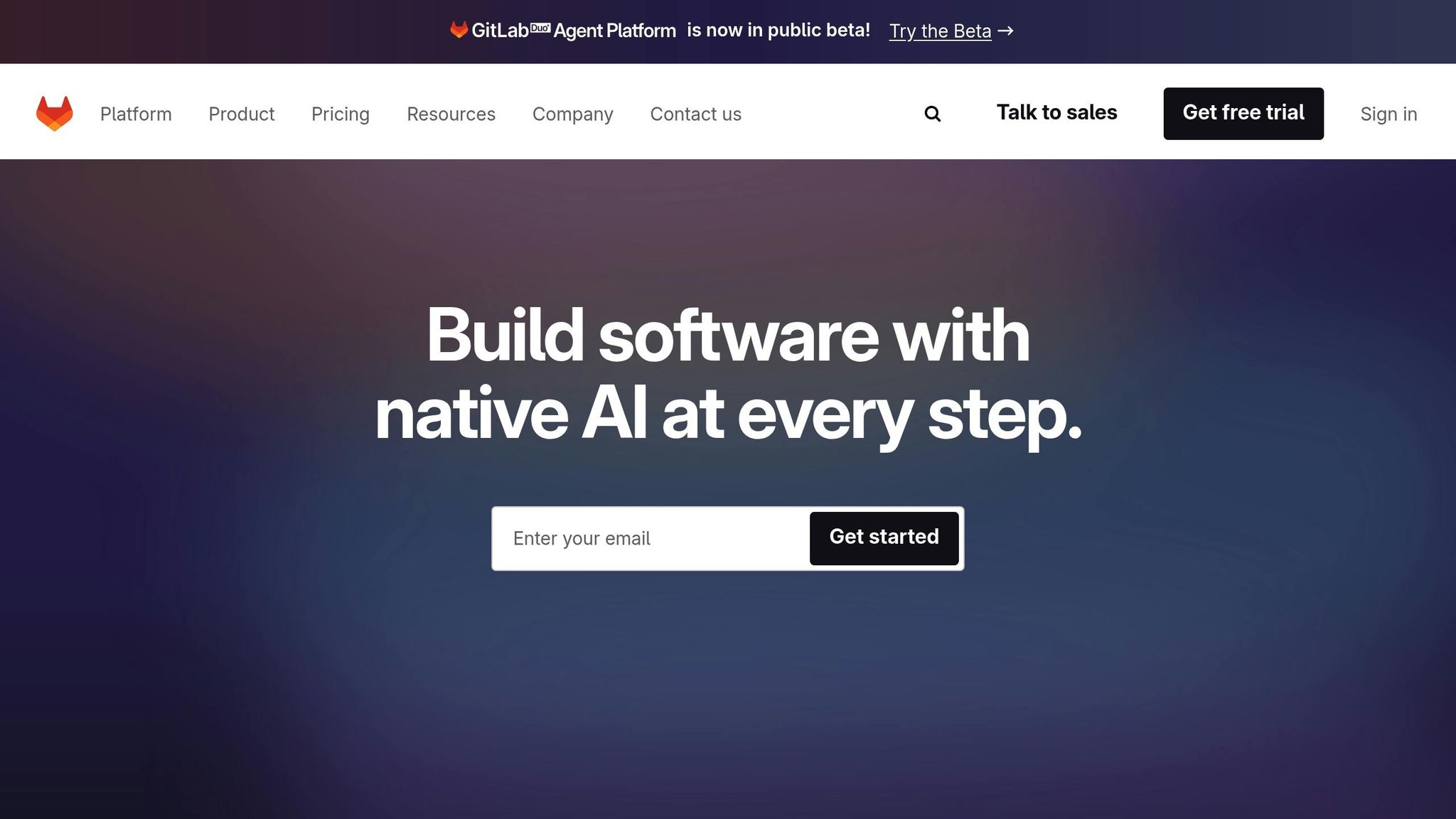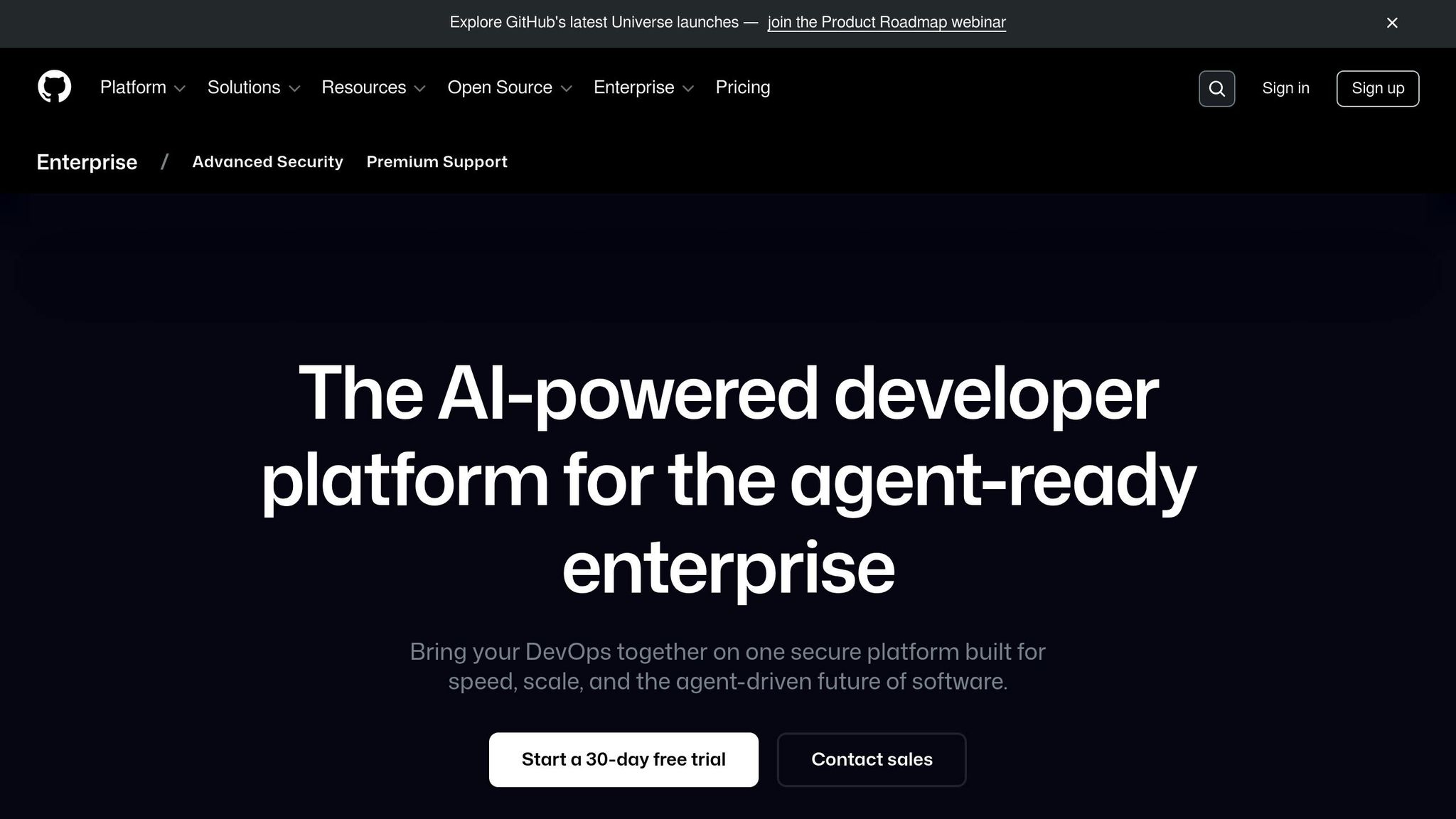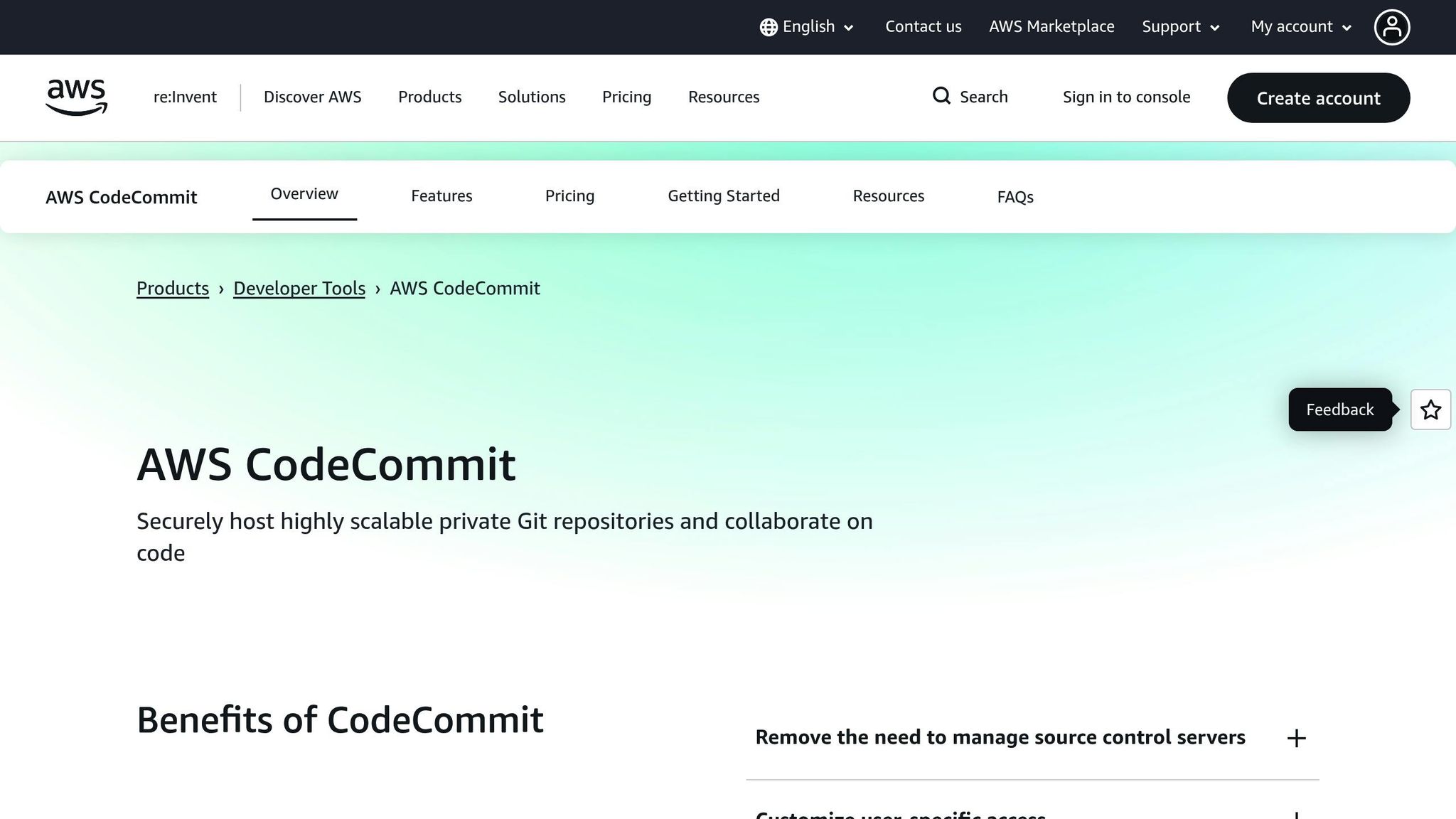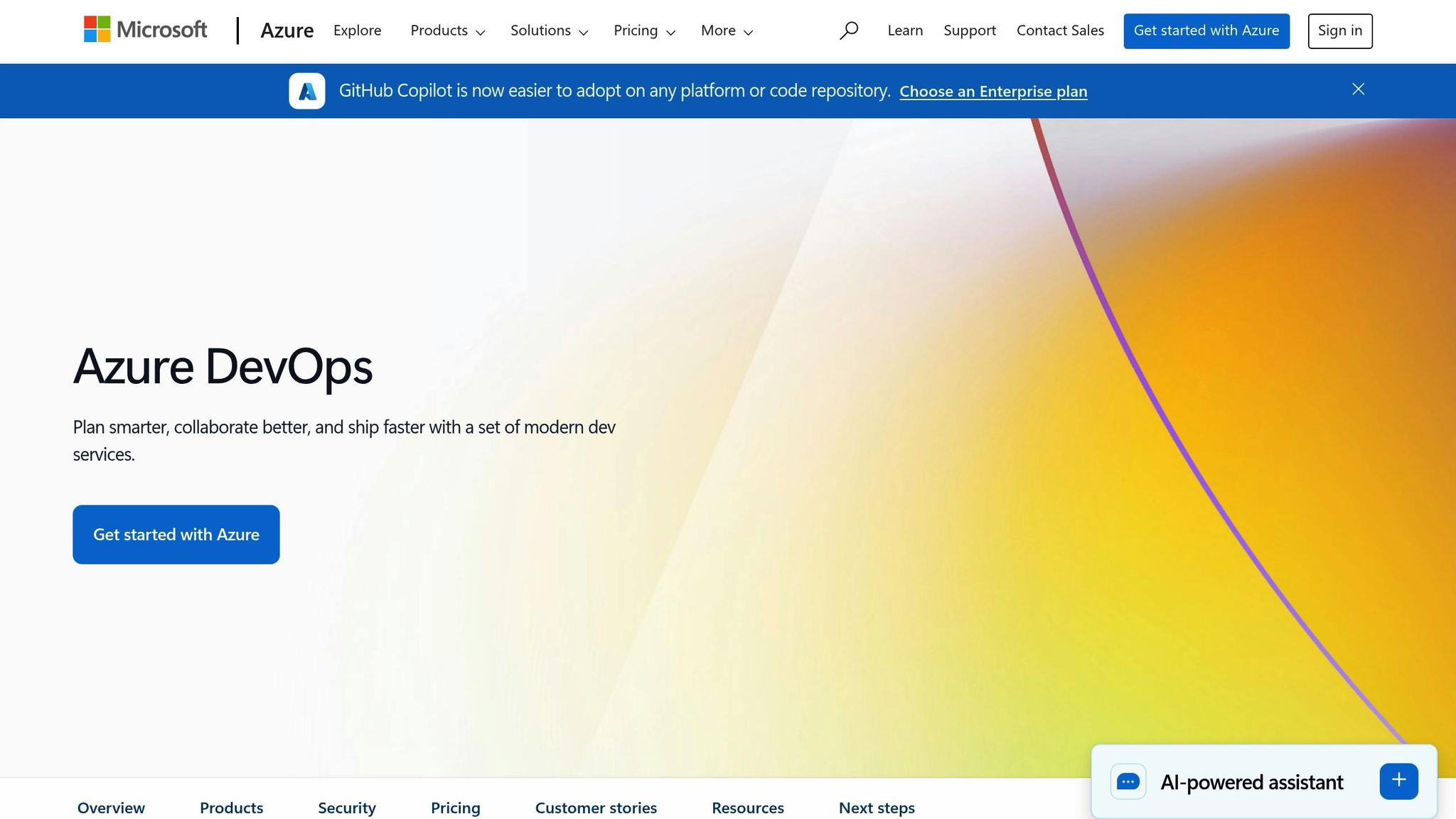Managing code in multi-cloud and hybrid setups is tough - but essential. With 90% of large enterprises operating in these environments by 2025, UK organisations face unique challenges: strict compliance (GDPR, data sovereignty), cost control, and operational complexity. Choosing the right version control platform is critical for balancing these demands.
Here’s a quick overview of four leading platforms and their strengths for multi-cloud:
- GitLab: Unified DevOps tools, strong multi-cloud integration, and advanced security features.
- GitHub Enterprise: Flexible deployment (cloud or self-hosted), user-friendly, and excellent scalability.
- AWS CodeCommit: Best for AWS users, secure, but limited flexibility for other clouds.
- Azure DevOps: Great for Microsoft ecosystems, scalable pipelines, and multi-cloud compatibility.
Key takeaway: GitLab and GitHub Enterprise are ideal for multi-cloud flexibility, while AWS CodeCommit and Azure DevOps shine within their native ecosystems. For UK enterprises, compliance and cost optimisation remain top priorities when selecting a platform.
What comes after Git? or, Building a cloud-native version control system in F# - Scott Arbeit
1. GitLab

GitLab is a standout platform designed to simplify the challenges of version control in multi-cloud environments. By offering a unified DevOps solution, it eliminates the need for fragmented toolchains, making management across different cloud providers much more straightforward.
Multi-cloud compatibility
GitLab works seamlessly with major cloud providers like AWS, Azure, and Google Cloud, making it a great fit for UK businesses that rely on multiple clouds. Its Kubernetes support ensures smooth orchestration in hybrid environments, while its API and webhook system allow integration with third-party tools. Additionally, GitOps workflows enable changes to both infrastructure and applications to be managed as code, streamlining governance across complex setups.
Scalability and performance
GitLab is built to scale. It supports horizontal scaling through distributed runners and high-availability configurations. Premium and Ultimate plans come equipped with advanced features like load balancing, database replication, and caching, enabling the platform to handle thousands of concurrent users and jobs - ideal for large enterprises. Whether organisations opt for self-managed or SaaS deployments, GitLab offers the flexibility to tailor the solution to their scalability requirements. These performance capabilities are further complemented by its strong security framework.
Security and compliance
Security is a core strength of GitLab, meeting the rigorous regulatory requirements of the UK. Features like role-based access control (RBAC), audit logs, and integrations with SAML, LDAP, and OIDC ensure robust access management. Security scanning - covering SAST, DAST, and dependency checks - is integrated directly into CI/CD pipelines, ensuring vulnerabilities are identified and addressed throughout the development process. Compliance tools help organisations adhere to standards such as GDPR, SOC 2, and ISO 27001. For those prioritising data sovereignty, the self-hosted option allows data to remain on controlled servers.
Cost structure
GitLab offers a free tier along with paid plans starting at approximately £23 per user/month for Premium and £79 per user/month for Ultimate (VAT included). While the self-managed version can reduce subscription fees, it may lead to additional infrastructure and maintenance costs. In multi-cloud setups, extra expenses might arise from additional runners, storage needs, or integrations with cloud-native services. However, GitLab’s all-in-one approach can eliminate the need for multiple tools, potentially reducing the overall cost of ownership. This balance of features and pricing makes it an attractive option for UK enterprises tackling multi-cloud challenges.
For businesses looking to maximise GitLab's potential in multi-cloud environments, expert consultancy can be invaluable. Firms like Hokstad Consulting (https://hokstadconsulting.com) can provide tailored advice to optimise configurations, manage costs effectively, and ensure compliance with the UK’s complex regulatory environment.
2. GitHub Enterprise

GitHub Enterprise takes the all-in-one concept pioneered by GitLab and fine-tunes it for businesses navigating the challenges of multi-cloud version control. Designed with UK organisations in mind, it ensures seamless operations across diverse cloud environments while addressing strict regulatory requirements.
Multi-cloud compatibility
GitHub Enterprise shines in multi-cloud settings thanks to its flexible deployment options. Businesses can choose between GitHub Enterprise Cloud (a SaaS solution) or GitHub Enterprise Server (a self-hosted option). The server version can be deployed on AWS, Azure, Google Cloud, or even on-premises infrastructure. This flexibility is particularly valuable for UK financial institutions, which often use private clouds to meet compliance standards while leveraging public cloud integrations for scalability and efficiency [2].
The platform is built for consistency, offering an intuitive interface across all infrastructures. Whether you're deploying serverless functions or containerised apps, the user experience remains the same. This uniformity reduces the learning curve and cuts down on the operational challenges often associated with multi-cloud setups.
Scalability and performance
Designed to handle enterprise-scale operations, GitHub Enterprise supports large, distributed teams without breaking a sweat. Its horizontal scalability features include repository replication, load balancing, and seamless integration with cloud-native CI/CD pipelines via GitHub Actions. These tools ensure that performance remains steady across different regions and cloud providers.
For UK-based global businesses managing thousands of repositories, GitHub Enterprise automates deployments across multiple clouds, leading to shorter build times and higher developer productivity [2]. The platform’s high availability configurations and distributed architecture ensure that work continues uninterrupted, even if a specific cloud region experiences downtime. This resilience is matched by its robust security framework.
Security and compliance
GitHub Enterprise doesn’t just prioritise performance - it embeds advanced security features to meet the UK’s stringent compliance standards. Key features include SAML/SSO integration, granular access controls, detailed audit logs, and built-in secret scanning. Together, these tools create a secure environment for managing code across multiple clouds.
For organisations bound by strict regulations, the platform offers data residency options to comply with GDPR and other UK-specific rules. For example, UK healthcare providers use GitHub Enterprise to protect patient data while maintaining detailed audit trails for compliance purposes [2]. Automated vulnerability scanning and policy enforcement further enhance security, ensuring that codebases remain protected across all environments.
The platform also supports short-lived cloud credentials (OIDC), which eliminate the risks associated with long-lived static keys in multi-cloud deployments [2]. This aligns with modern security practices, helping organisations maintain a strong defensive posture.
Cost structure
GitHub Enterprise offers clear pricing, starting at around £16–£18 per user per month for the Enterprise Cloud plan, with custom pricing available for Enterprise Server and larger deployments [2]. UK businesses benefit from predictable annual costs in GBP, simplifying financial planning and budgeting.
The choice between cloud-hosted and self-hosted models allows organisations to balance costs with their specific needs. Self-hosted setups may involve additional infrastructure expenses, but they provide greater control over data sovereignty and compliance. Volume discounts and tailored agreements make the platform a cost-efficient choice for larger teams requiring extensive collaboration and integration.
For businesses looking to maximise their investment in GitHub Enterprise, expert guidance can make all the difference. Hokstad Consulting (https://hokstadconsulting.com) supports UK organisations by optimising cloud costs and streamlining deployment cycles. They specialise in integrating GitHub Enterprise with custom automation tools and AI-driven DevOps solutions tailored for public, private, and hybrid cloud environments [2].
3. AWS CodeCommit

AWS CodeCommit is Amazon's fully managed Git service, designed specifically for organisations already embedded in the AWS ecosystem. While it thrives within AWS environments, using it across multiple cloud platforms requires additional effort.
Multi-cloud compatibility
For organisations juggling repositories across different cloud providers, integrating CodeCommit can be challenging. It demands custom automation and adjustments to CI/CD pipelines. For example, connecting CodeCommit to non-AWS platforms involves managing credentials carefully and ensuring network security is robust. Despite these hurdles, CodeCommit's ability to scale makes it a reliable choice for UK-based businesses, regardless of team size.
Scalability and performance
Thanks to AWS's global infrastructure, CodeCommit scales automatically as your team grows, sparing you the hassle of manual provisioning. However, for globally distributed teams, network latency could still be a concern, depending on their geographical spread.
Security and compliance
Security is a standout feature of CodeCommit. It uses encryption for data both at rest and in transit and integrates seamlessly with AWS IAM to provide detailed access controls. Additionally, audit logging through AWS CloudTrail helps organisations meet compliance standards like GDPR and ISO 27001. For CI/CD pipelines, short-lived credentials supported by AWS IAM and OIDC add an extra layer of security. Organisations can also choose specific AWS regions for data storage, which is particularly important for meeting UK data protection laws.
These capabilities make CodeCommit highly secure, though its AWS-focused design may limit its flexibility in multi-cloud setups.
Cost structure
CodeCommit's pricing model is straightforward and adaptable. It includes a free tier for up to five users per month, offering 50 GB of storage and 10,000 Git requests. Beyond this, additional users cost around £0.80 per month, with extra storage and requests billed separately [2]. This pay-as-you-go approach works well for smaller teams but could become pricey for larger teams, especially if additional tools are needed for multi-cloud integration.
For UK organisations aiming to streamline their multi-cloud strategies, expert advice can be invaluable. Hokstad Consulting (https://hokstadconsulting.com) provides tailored guidance to help design secure and cost-efficient multi-cloud DevOps workflows.
Need help optimizing your cloud costs?
Get expert advice on how to reduce your cloud expenses without sacrificing performance.
4. Azure DevOps

Azure DevOps enhances leading version control systems by offering flexible multi-cloud connectivity and competitive pricing options. It provides a robust development platform that supports workflows across multiple cloud providers, using configurable pipelines and REST APIs to streamline integration.
Multi-cloud compatibility
Azure Pipelines allows teams to deploy code simultaneously to AWS EC2 instances, Google Cloud Functions, and Azure resources - all from a single interface. REST APIs further simplify integration with different cloud providers, maintaining consistent version control processes no matter where your applications are hosted [1][4].
The service connections feature simplifies authentication across various cloud platforms, removing the need for complex credential management. Additionally, Azure DevOps integrates easily with existing version control systems, ensuring smooth operations. This seamless connectivity lays a strong foundation for scaling, which is explored in the next section.
Scalability and performance
Azure DevOps is built to handle large-scale operations, with its distributed agent system managing thousands of concurrent builds and deployments. CI/CD pipelines automatically scale based on demand, while caching and artifact storage help reduce build times for distributed teams [4][2].
These performance benefits are especially valuable for large organisations. Parallel jobs and load balancing ensure teams aren’t left waiting for resources, and geo-replication reduces latency for global teams. For UK businesses with international development offices, this translates to faster workflows and improved efficiency.
Security and compliance
Azure DevOps prioritises security, offering enterprise-grade features such as role-based access control (RBAC) integrated with Azure Active Directory. This enables granular permissions management across projects and repositories. Additional safeguards like multi-factor authentication and audit logs ensure secure and well-documented activity [5][2].
For UK organisations in regulated industries, the platform supports custom security policies and data residency options, ensuring compliance with the Data Protection Act 2018. Sensitive data can be stored within UK or EU data centres to meet regulatory requirements.
A UK-based financial services company reported a 40% reduction in deployment times after implementing integrated security policies and audit trails, while also improving visibility across cloud environments. Beyond security, cost considerations also play a major role in adoption decisions.
Cost structure
Azure DevOps offers a tiered pricing model, starting with a free tier suitable for small teams. Basic users are charged around £4 per month, with additional costs for advanced services like Test Plans and Artifacts. UK customers benefit from billing in GBP.
While the pay-per-user model may become costly for larger teams - especially when adding parallel build agents or requiring extensive storage - organisations already invested in Microsoft’s ecosystem often find the integration benefits outweigh the costs. Enterprise agreements can also provide better pricing for large-scale deployments.
For UK organisations looking to refine their multi-cloud DevOps strategies, expert guidance can make a significant difference. Hokstad Consulting (https://hokstadconsulting.com) specialises in helping businesses design cost-effective multi-cloud workflows and maintain compliance in complex environments.
Advantages and Disadvantages
Every version control platform comes with its own set of benefits and drawbacks. Weighing these trade-offs is crucial for organisations to make decisions that align with their needs and existing systems.
Here’s a summary of the key strengths and limitations of the platforms discussed earlier:
GitLab stands out with its strong multi-cloud support and built-in CI/CD tools, which minimise the need for additional software. However, its costs can rise significantly as usage scales, and self-hosted setups demand both expertise and ongoing maintenance.
GitHub Enterprise is widely adopted, offering extensive third-party integrations and a supportive community. Its familiar interface reduces onboarding time, making it easier to find skilled developers. On the downside, enterprise pricing can be steep, and the SaaS model may limit customisation for organisations in heavily regulated sectors.
AWS CodeCommit integrates seamlessly with the larger AWS ecosystem and offers attractive pricing - free for up to five users, with an additional cost of around £0.80 per active user per month. However, its limited multi-cloud capabilities could lead to vendor lock-in and workflow inconsistencies when working across different cloud providers.
Azure DevOps delivers a comprehensive toolkit with robust scalability and competitive pricing. It integrates well with Microsoft’s ecosystem and supports flexible deployment options. That said, hybrid configurations can be complex and may involve additional licensing costs, and the platform is primarily optimised for Microsoft environments.
Below is a quick comparison of these platforms:
| Solution | Pros | Cons |
|---|---|---|
| GitLab | Strong multi-cloud support, integrated CI/CD, flexible deployment options | High costs at scale, complex self-hosted setup, ongoing maintenance overhead |
| GitHub Enterprise | Wide adoption, extensive integrations, strong community support | Expensive enterprise features, limited customisation options |
| AWS CodeCommit | Tight AWS integration, cost-effective pricing | Limited multi-cloud support, potential vendor lock-in, inconsistent workflows |
| Azure DevOps | Comprehensive tooling, good scalability, competitive pricing | Complex hybrid configuration, additional licensing costs, optimised for Microsoft environments |
Interestingly, 93% of enterprises now operate in multi-cloud environments [6]. Yet, more than half of these multi-cloud initiatives are expected to fall short of their goals by 2029, largely due to challenges with interoperability and fragmented operations [3].
Cost remains a critical concern. While 81% of enterprises identify cost optimisation as a key motivation for adopting multi-cloud strategies, only 25% feel they’re achieving the full return on investment (ROI) from these efforts [6].
For organisations navigating these challenges, Hokstad Consulting (https://hokstadconsulting.com) offers tailored solutions to optimise DevOps strategies and cloud infrastructure. Their expertise focuses on cutting costs while improving deployment cycles in multi-cloud environments.
Conclusion
The future of version control in multi-cloud environments offers both opportunities and hurdles for UK enterprises. Platforms like GitLab and GitHub Enterprise stand out for their ability to deliver robust CI/CD pipelines across varied infrastructures. Meanwhile, AWS CodeCommit and Azure DevOps shine within their native ecosystems but may lack the same level of flexibility for multi-cloud setups.
Gartner predicts that over 50% of multi-cloud initiatives could underperform by 2029 due to fragmented operations and immature governance frameworks [3]. This underscores the importance of choosing the right platform and establishing strong governance practices from the beginning.
For UK businesses, the decision-making process should consider existing cloud investments, regulatory obligations, and long-term goals. Companies already embedded in AWS or Azure ecosystems might find CodeCommit or Azure DevOps better aligned with their regulatory and investment priorities. On the other hand, organisations aiming to avoid vendor lock-in or needing seamless multi-cloud orchestration may find GitLab or GitHub Enterprise more suited to their needs due to their broader cross-cloud capabilities.
Cost control remains a pressing priority. Hokstad Consulting, for instance, has demonstrated expertise in cutting costs by 30%-50% and speeding up deployments by as much as 75% through tailored DevOps and cloud cost engineering strategies (https://hokstadconsulting.com).
With the growing emphasis on sovereign cloud requirements, UK enterprises must carefully balance regulatory compliance with operational efficiency. The emergence of AI-driven automation and GitOps workflows introduces exciting possibilities but requires thoughtful implementation to avoid operational silos. These complexities highlight the importance of a unified and forward-looking strategy.
Ultimately, success in this space goes beyond selecting the right tools. It demands a comprehensive approach that includes effective governance, disciplined cost management, and continuous optimisation. For UK enterprises striving to maximise their multi-cloud investments while staying compliant and cost-efficient, seeking expert guidance could be the key to achieving sustainable success.
FAQs
What should UK businesses consider when selecting a version control system for multi-cloud environments?
When selecting a version control system for multi-cloud environments, UK businesses should focus on compatibility with various cloud platforms. This ensures smooth collaboration and integration across different environments. Opt for systems that support hybrid cloud setups, allowing flexibility between public and private cloud solutions.
It's also crucial to prioritise security compliance with UK and EU regulations like GDPR to protect sensitive data effectively. Another important factor is scalability - choose a platform that can accommodate increasing workloads and geographically dispersed teams. Lastly, look for tools that improve automation and efficiency, such as built-in CI/CD pipelines, to simplify development processes and help cut operational costs.
What are the key differences in how GitLab and GitHub Enterprise handle multi-cloud compatibility and compliance?
GitLab and GitHub Enterprise both cater to multi-cloud environments, but they take slightly different paths to address organisational needs. GitLab provides an all-in-one DevOps platform, combining tools for version control, CI/CD, and infrastructure automation. This setup makes it a strong choice for hybrid and multi-cloud configurations. GitHub Enterprise, meanwhile, shines in its ability to streamline code collaboration and repository management, offering integrations that can be customised to fit multi-cloud workflows.
When it comes to compliance, GitLab steps up with advanced security and governance features like audit logs and compliance pipelines, which are especially valuable for industries with strict regulations. GitHub Enterprise isn't far behind, offering tools such as secret scanning and dependency review to help organisations maintain governance standards while managing code across diverse cloud platforms.
How can businesses optimise costs and ensure compliance in a multi-cloud environment using tools like GitLab or Azure DevOps?
To manage costs effectively in a multi-cloud environment while staying compliant, businesses can implement strategies like DevOps transformation, cloud cost engineering, and strategic cloud migration. These methods help cut down on excessive cloud spending and simplify processes, making deployments more efficient.
Getting expert assistance can be a game-changer. For instance, using customised cloud solutions and automation tools can slash costs by 30–50%, all while adhering to industry regulations. Moreover, tapping into expertise in hybrid and multi-cloud configurations allows businesses to strike the right balance between cost savings, robust security, and operational requirements.
